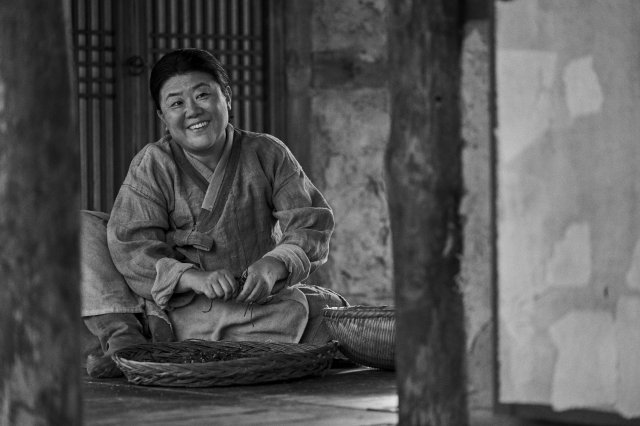[HanCinema's Film Review] "The Book of Fish"
 By Panos Kotzathanasis | Published on
By Panos Kotzathanasis | Published on
Lee Joon-ik proved in the most impressive way, that he can direct biopics in black-and-white, when he released "DongJu, The Portrait of A Poet" one of the best films of the last few years. Continuing in the same visual recipe, he has now come up with one set in 1801, about the Joseon era scholar Jeong Yak-jeon.
"The Book of Fish" is screening on New York Asian Film Festival
As the story begins, the ascend of the new king on the throne terminates the protagonist's good relations with the Palace, as the Catholic Persecution under King Sunjo becomes a full blown endeavor, essentially deeming any dogma outside Confucianism "Evil Learning", with all its representatives being imprisoned, killed, or in the case of Jeong Yak-jeon and his brother, exiled. The former finds himself stranded to Heuk-san island, where the locals treat him either as a sample of exoticism (particularly the housewife who eventually takes him up on her house) or as a nuisance (the local magistrate) or as a miasma (fictional character Chang-dae). The latter, however, happens to be a young man thirsty for knowledge, but also an excellent diver and one possessing vast knowledge about the local fish. Yak-jeon is intrigued by the young man, and eventually decides to write an Encyclopedia on Korea's indigenous fish with his help, but, initially, the young man wants nothing to do with him. Eventually, he warms up and the exiled becomes his mentor. As more about the young man's past is revealed, however, the more complicated their situation becomes.
Advertisement
Lee Joon-ik directs an impressive biopic which thrives on the presentation of the era, both in the remote island and in the mainland, the individual portraits of the two protagonists, and their relationship. Regarding the first aspect, the story begins with the way Catholics were persecuted relentlessly, as they were considered a danger to the Confucianism-driven status quo. The narrative eventually returns to the politics of the palace and the way the system worked in the era, in order to show how corruption ruled, and how a number of officials took advantage of Confucianism in order to fill their pockets and exploit the poor, with the latter living a life full of despair, in one of the most dramatic but also pointed comments in the film.
The difference of the two protagonists, with Yak-jeon being an educated aristocrat who has fallen completely out of grace and Chang-dae being a rather popular country bumpkin is one of the most appealing aspects of the movie, also because it shows the connection they share through their common thirst for knowledge. Lee also takes care of analyzing the characters individually before he starts focusing on their relationship, in an approach that also seems to state how the past shapes the future of people. Furthermore, the way both change through their interaction is another great aspect. On the other hand, a bit of melodrama could not be missing from here, particularly in the way the story ends, but in general, Lee manages to keep things to a measured point. The same applies to the correspondence between the two brothers, which is both narrated and presented with letters on screen, and the whole concept of poetry, both of which could end up being pretentious in a less steady directorial hand.
Apart from melodrama, however, Lee has also included much humour here, mostly deriving from the interactions between Jeong Yak-jeon and his landlady, with Lee Jung-eun giving a great performance in the latter role. The same, although in ironic/mocking fashion, also applies to the local magistrate, who is presented as an almost illiterate, money-thirsty buffoon, with his characterization adding to the critique of the system.
The acting in general is top-notch here. Sol Kyung-gu gives a magnificent performance as Yak-jeon, with the transformation he undergoes from annoyance, to despair, to eagerness, to mentorship, to sadness being excellently portrayed, and in a measured fashion that fits the general aesthetics of the movie. Byun Yo-han as Chang-dae is also convincing in his own transformation towards disillusionment, as much as his attitude towards Yak-jeon, while his relationship with his father is also among the most interestingly portrayed aspects of the movie.
Of course, this review would not be complete without mentioning the exquisite, sharp-contrasted, monochrome cinematography of Lee Eui-tae, who manages to highlight all the film's aspects in the most meaningful way. Particularly the recurring frame of who is inside the house and who outside is truly exquisite, also in the way it showcases the dynamics between the various characters each time. Lastly, the presentation of the beauties of the island, as much as the depiction of the various local dishes is also of the highest level. Kim Jeong-hoon-III's editing is of equal quality, with the pace being ideal, as much as the placement of the flashbacks and the way the flash forwards are communicated.
"The Book of Fish" is another testament that Lee Joon-ik is one of the best contemporary directors in presenting historic events, in a movie that is definitely among the best of the year.
Review by Panos Kotzathanasis
___________
"The Book of Fish" is directed by Lee Joon-ik, and features Sol Kyung-gu, Byun Yo-han, Lee Jung-eun, Min Dohee, Cha Soon-bae, Kang Ki-young. Release date in Korea: 2021/03/31.
 Panos Kotzathanasis
Panos Kotzathanasis
Panos Kotzathanasis is a film critic and reviewer specialising in East Asian Cinema. He is the founder of Asian Film Vault, administrator of Asian Movie Pulse and also writes for Taste of Cinema, Eastern Kicks, China Policy Institute and Filmboy. You can follow him on Twitter and Facebook. Panos Kotzathanasis can be contacted via sinkazama82@gmail.com.


